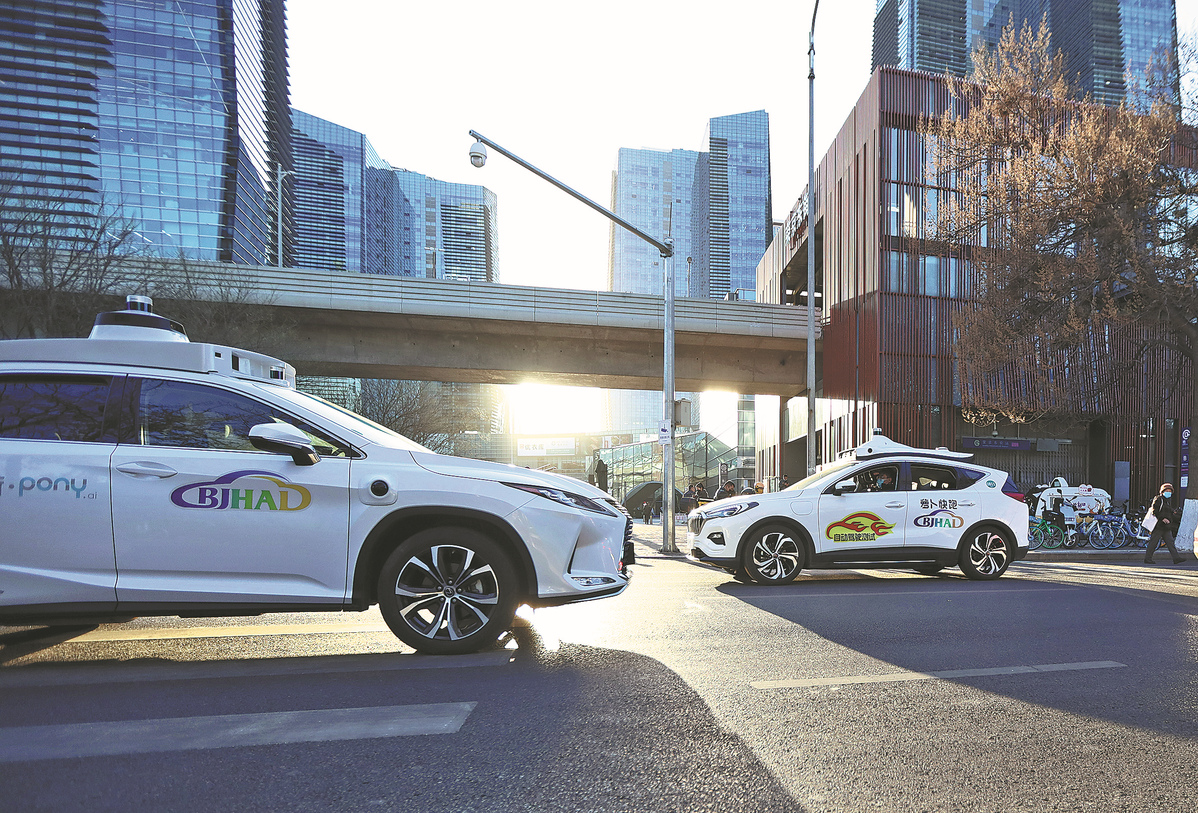Nation to boost policy support for smart cars

Baidu and Pony.ai's autonomous driving vehicles test on the street in Yizhuang in Beijing's southern suburbs. [PHOTO/CHINA DAILY]
China will enhance its policy support to accelerate the development of emerging industries such as smart connected vehicles, as the nation has huge potential to become the world's largest market for self-driving cars, according to an official and experts.
This could create multibillion-dollar opportunities for domestic as well as international companies, they added.
To support the high-quality development of the intelligent vehicle industry, cars in China are expected to get their own "phone numbers".
The Ministry of Industry and Information Technology said it plans to allocate a total of 100 million 11-digit mobile network numbers dedicated to facilitating communication among vehicles, and between vehicles and the back-end management systems of carmakers.
The ministry did not provide a specific time frame for the implementation of the plan, but experts said the move will give the development of internet-connected vehicles a big boost.
Yang Zongyi, an auto expert at Chinese car manufacturer BAIC Motor Corp, said: "With the support of connectivity technologies, vehicles are no longer just a means of transportation, but rather a mobile intelligent device. Traffic lights, parking lots and even roads can all interact with our connected cars, providing our users with a more intelligent and convenient travel experience."
For instance, two connected vehicles can "talk to each other" and the drivers can see each other's location, route and fuel consumption on a large screen, Yang said.
Huang Hexian, a telecom expert at the China Academy of Information and Communications Technology, said that compared with smartphones, internet-connected vehicles have stricter requirements for network bandwidth, network response time, security, manageability and controllability of communication services.
This is why the ministry plans to allocate 100 million network numbers to vehicles, which will give the development of internet-connected vehicles a big boost, she said.
In an article published on Saturday in Qiushi Journal, the flagship magazine of the Communist Party of China Central Committee, Minister of Industry and Information Technology Jin Zhuanglong said that more efforts will be made to accelerate the development of smart connected vehicles.
"By proactively adapting to and leading the new wave of technological revolution and industrial transformation, we can ensure that technological innovation truly contributes to industrial development," he said.
China will make good use of its large domestic market and diverse application scenarios, and systematically advance technological innovation, in order to drive the healthy and orderly development of emerging industries such as 5G networks and smart connected vehicles, Jin added.
Fu Bingfeng, executive vice-president and secretary-general of the China Association of Automobile Manufacturers, said, "Autonomous vehicles will become popular in China at a faster pace than in other countries, as local consumers are very enthusiastic and curious about such functions."
Consulting firm McKinsey & Co has predicted that China will become the world's largest market for autonomous vehicles, with revenue from such vehicles and mobility services exceeding $500 billion by 2030.
Total autonomous vehicle sales are expected to hit $230 billion, while autonomous vehicle-based services are likely to generate around $260 billion by the end of the decade, it said.
According to Fu, China is likely to roll out more measures, such as optimizing its legal framework and boosting vehicle-and-road coordination, to fuel further development of autonomous vehicles.
Cui Dongshu, secretary-general of the China Passenger Car Association, said that traditional ways of managing cars are no longer feasible, and more efforts are needed to ensure automotive data security and privacy.
"How to strike a balance between encouraging industrial innovation and ensuring safety is the top question for us to answer before really stepping into the era of autonomous vehicles," he added.
Photos
Related Stories
- China's used vehicle sales up 14.68 pct in April
- Han Wei clinches 4th championship as Taklimakan Rally concludes
- China's new energy products captivate at Hungary's GreenTech conference
- Cellphone maker Xiaomi has EV market buzzing
- SW China's Chongqing emerges as hub for high-tech auto manufacturing
- Interview: U.S. high tariffs on Chinese EVs ineffective, harmful -- Croatian expert
Copyright © 2024 People's Daily Online. All Rights Reserved.









